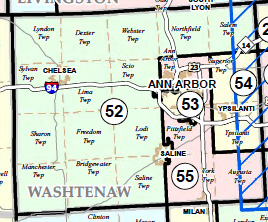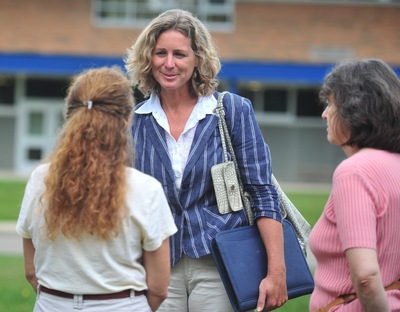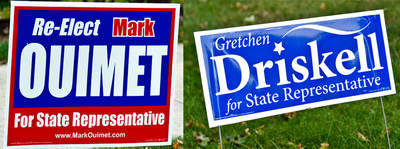Clik here to view.

The race is close for the 52nd District seat in the Michigan House of Representatives between Democrat Gretchen Driskell and incumbent Republican Mark Ouimet, pictured here posing for a photo together recently at the West Washtenaw Business Association candidate forum at Weber's Inn in Ann Arbor.
Melanie Maxwell I AnnArbor.com
Longtime Saline Mayor Gretchen Driskell, a Democrat, is challenging Mark Ouimet, a one-term Republican incumbent from Scio Township who previously represented western Washtenaw County on the Board of Commissioners for six years.
Ouimet's plan is to create a better environment for businesses in Michigan communities by decreasing government regulations and developing a better tax structure, while Driskell says she wants to start with reinstating funding to educational institutions and local governments to create a knowledge economy.
For Michigan Democrats, a win in the currently Republican 52nd District could help them regain control of the House.
"Western Washtenaw is a huge opportunity for Democrats and it is critical to our statewide plan to make education a priority again," said state Rep. Jeff Irwin, chairman of the House Democratic Caucus. He said Ouimet should not be able to survive in Washtenaw County on a voting record that includes cutting support for K-12 schools and the University of Michigan.
"We have an excellent candidate and we know that if we can effectively communicate Ouimet's voting record to the public, then we will win," Irwin said.
But Ouimet believes the odds are in his favor. He notes the district has been redrawn since he won election so that it leans more heavily Republican than it used to.
“I was elected in a Democratic district, and now it’s been redistricted to a Republican district,” Ouimet said of his 2010 win against Democrat Christine Green with 51.7 percent of the vote. “I really haven’t changed how I go about things.”
Ouimet has raised considerably more campaign funds than Driskell — but has invested more of his own money in the race.
The most recent post-primary campaign finance reports on file show Ouimet's campaign with a fund balance of $91,464 and Driskell's campaign with a fund balance of $54,490.
Driskell ran for the non-partisan Saline City Council in 1993, ran for mayor in 1998 and has served ever since. Professionally, she’s a commercial Realtor.
Ouimet is a freshman legislator in the State House and previously served three terms on the Washtenaw County Board of Commissioners. He has a background in banking.
Clik here to view.

State Rep. Mark Ouimet watches Michigan Governor Rick Snyder speak Monday night at a town hall meeting at the Liberty School Auditorium in Saline.
Courtney Sacco I AnnArbor.com
"You've got a great representative here — he's come up and yelled at us on your behalf," Snyder said to more than 100 people that gathered for the Saline town hall Monday.
Ouimet said he didn't pay Snyder to visit but said he did pay the rental fees for the space at Saline Liberty School Auditorium. Ouimet refrained from campaigning during the event.
Driskell said she was unable to attend, as a Saline City Council meeting was at the same time and her top priority.
Closely divided electorate
In recent elections, voters in the 52nd District have been closely split. Redistricting in 2011 eliminated the city of Ann Arbor from the district. It now consists of the townships of Lyndon, Dexter, Webster, Northfield, Salem, Sylvan, Lima, Scio, Sharon, Freedom, Lodi, Manchester, Bridgewater and Saline; as well as the cities of Chelsea and Saline and the Village of Dexter.
Clik here to view.

The Michigan House of Representative's 52nd District consists of much of western Washtenaw County.
Courtesy of the Department of Technology, Management and Budget
In the 2004 presidential election, Democrat Barack Obama won 54 percent of the vote in what would be the new 52nd District compared with John McCain's 44 percent, according to an analysis of county election records.
Ouimet won the previously Democratic district in 2010. The redrawn district includes less Democratic territory than it did when it included Ann Arbor.
Driskell’s campaign views the electoral split as 50-50, but Ouimet believes the district leans right.
Ouimet said he also believes he’s gaining ground with his constituents since the 2010 election.
“When I was holding town hall meetings and events in April, May and June of last year, there were some of angered folks. Now, people — they get it. I’m not saying everyone likes it — every piece of legislation. But most of the people I talk to say, I’m willing to do the sacrifice if we’re all sacrificing,” Ouimet said. “Now, revenues are up, and we’re able to look back and fully fund things, and I think temperament has improved and unemployment has improved from 14.5 percent to 8.5 percent.”
The improving economy is one Driskell said she wants to capitalize on— and she said she doesn’t believe Ouimet and the House Republicans are doing enough to push the economy forward.
“There are times when we need to cut; I recognize when we were barely making ends meet that we couldn’t afford statutory revenue sharing, but as the economy continues to grow, I don’t see a correlation there — they aren’t bringing statutory revenue sharing back — they’re cutting more of it,” Driskell said. “Whatever we did in the past, that doesn’t mean that’s what we need to do in the future.”
As the campaign has progressed, anti-Ouimet ads and anti-Driskell ads have surfaced across multiple fronts. Both candidates have stated they have not funded the ads, and that the ads come from the state-level Democratic and Republican parties.
"I wish that third parties wouldn't do those types of things," Ouimet said. "You don't have any control over it — and I prefer that it not occur."
Driskell said she believes her multiple terms as mayor speak for themselves.
"A lot of people take it with a grain of salt," Driskell said of the campaign literature that surfaces during election season. "It would be really nice to talk about what the facts are."
Education
Driskell came out strong early in her campaign this summer to criticize the Republican-led state legislature’s cuts to education funding.
During his 2010 campaign, Ouimet ran on a platform of balancing the state’s budget on time — something he now touts as his greatest accomplishment — and working in a bipartisan fashion.
Ouimet said he feels he’s held true to his bipartisan stance — citing a legislator of the year award he received during his first year in office from the Michigan Townships Association.
However, his bipartisan approach has made some of his campaign statements relatively cautious.
Clik here to view.

Driskell at a recent campaign event where she called for more funding for education
Ryan J. Stanton | AnnArbor.com
Driskell said Investing in the knowledge economy is her approach to turning the state around.
“If we want to diversify our economy and grow our economy, we need more adults and young adults educated,” Driskell said. “Education is the easiest way to bring the economy forward in Michigan.”
Though Ouimet acknowledges most of his constituents are concerned with the issue of education funding, he wants to focus on helping the state pay down its debt.
“It is an economic engine — our educational system. What do you do if you say let’s go back and fund public university education at 75 percent? Where are we going to get the money? If we did that, we would have to close every prison in the state of Michigan. And I’m not sure that people would feel that is the right thing to do,” Ouimet said. “I think we’ve got to continue to deal with our long-term debt in the state that’s on our balance sheet. We’ve paid down $15 million I think continuing to work on our balance sheet to make it much more manageable, to be less intrusive in how government has to act because it’s so deeply in debt.”
Ouimet said he is a proponent of free enterprise and small business.
“Getting the auto industry back on track had a lot to do with where we are in the state,” Ouimet said, but he also noted most of the job growth isn’t in the auto industry.
“The vast majority of growth in the state of Michigan have been small hirings. That’s where our economy really starts to make massive improvements.”
The tax structure needs to be improved and government regulations on businesses need to be decreased in order to create an environment for high-quality jobs in communities, Ouimet said.
Most of Driskell’s positions on issues in the race for the state House seat circle back to her criticism of the funding cut to public school districts.
“I think local communities can do a lot, if given the right tools, and I think now we’re not being given the right tools in communities and schools,” Driskell said. “I’m concerned about the direction of the state because I personally think, in my experience in recruiting business not only as mayor, but as a commercial Realtor, trying to work with business and establish business, they’re looking for communities with those quality of place: Good schools and a vibrant downtown and great parks and recreation and healthy infrastructure — all the investments that we need to make.”
Personal property tax
On at least one big tax issue — the personal property tax companies pay on their physical property — Ouimet and Driskell found some common ground. They both said public institutions are dependent on it.
Ouimet said though that he doesn’t think it’s a good tax for business.
Clik here to view.

Ouimet celebrating the opening of Mitt Romney's presidential campaign office in Ann Arbor.
Ryan J. Stanton | AnnArbor.com
Ouimet said he would propose setting a floor for a minimal amount for businesses to pay.
“It’s 20 percent of our revenue right now, 9 percent of our library’s revenue, 9 percent of our school’s bond,” Driskell said of Saline. “We invested in all these business parks and we’re counting on receiving that personal property tax revenue.”
Driskell said she would only support eliminating the personal property tax if there was a guaranteed replacement for the funding to public institutions.
Businesses in Saline are growing and investing in more property without worrying about the personal property tax, Driskell said.
Driskell acknowledges she’s heard from automotive industry leaders that eliminating the personal property tax would make them more competitive, but for Saline, the town needs the revenue to survive, she said.
“The only way we get our revenues is property tax and personal property tax and revenue sharing. Our property tax is back where it was in 2005, and our statutory revenue sharing is back down where it was in the '90s,” she said.
Fracking
For the townships that make up the 52nd District, the possibility of hydraulic fracturing — a controversial exploratory way of extracting gas and oil — is an issue of strong local concern.
Under Michigan law, townships have no ability to control the oil and gas exploration activities that occur within their jurisdictions.
Driskell is more pronounced on her position on oil and gas exploration than Ouimet.
“I would like a moratorium on fracking until we understand it,” Driskell said. “We should be able to give local communities — whether they are cities or townships — more control.”
Ouimet has routinely marketed himself as a politician who can bridge the gaps between both parties — but he did not provide a solid answer to his position on fracking.
“It’s one of those issues I think we need, as a state legislative body, to really spend quality time on,” he said.
Ouimet said attitudes toward fracking differ greatly in the 52nd District.
Saline Township residents tend to believe in property rights and that landowners have the right to do what they want on their property, Ouimet said.
In Lodi Township, Ouimet said people are more worried about what’s going on next door.
“We haven’t done a lot at the state on this as of yet,” Ouimet said. “How do you support a Lodi Township and how do you support a Saline Township? That’s just kind of a microcosm as to what’s going on in the state of Michigan.”
Battleground Saline
Driskell’s Saline home sits on a block of North Ann Arbor Road littered with campaign signs — but they’re not all hers. Two doors down a house has an Ouimet yard sign prominently displayed.
Clik here to view.

Campaign signs pepper many yards across the 52nd District in western Washtenaw County, including these recently photographed in neighboring yards in Saline.
Joseph Tobianski | AnnArbor.com
Before being elected to his first term in the Michigan House in 2010, Ouimet served on the Washtenaw County Board of Commissioners as a representative of a Republican district in the western part of the county.
Saline residents state they’ve received anti-Driskell automated messages during the campaign and literature in their mailboxes.
A large billboard featuring Ouimet sits on the edge of a cornfield just west of Saline on West Michigan Avenue.
Along Ann Arbor-Saline Road, many neighbors have opposing signs squaring off in their yards.
Linda Kiser, a Saline resident for the past 30 years and an independent voter who lives two doors down from Driskell, said she views the mayor as even, fair and well-liked.
“(Driskell) would win again if she ran for mayor,” Kiser said.
Kiser said she’s concerned about her tax dollars and trusts Driskell to keep small towns in mind when making decisions at the state level.
But Bob Wild, 59, a professional photographer and Saline resident, said he’s voting for Ouimet because he doesn’t believe Driskell has done a good job of running the town economically during her time as mayor.
Wild, a registered Republican, said Saline has many state-of-the-art newly built facilities that he doesn’t find practical, given the economic climate.
“Mark Ouimet has a listening ear,” Wild said. “I believe he genuinely wants to hear from both sides and he’s a good man.”
Amy Biolchini covers Washtenaw County, health and environmental issues for AnnArbor.com. Reach her at (734) 623-2552, amybiolchini@annarbor.com or on Twitter.